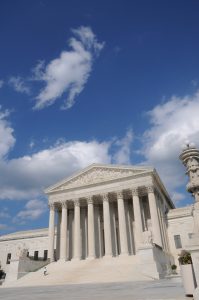By Adam Mossoff and Kevin Madigan
 Following the Supreme Court’s four decisions on patent eligibility for inventions under § 101 of the Patent Act, there has been much disruption and uncertainty in the patent system. The patent bar and most stakeholders in the innovation industries have found the Supreme Court’s decisions in Alice Corp. Read more
Following the Supreme Court’s four decisions on patent eligibility for inventions under § 101 of the Patent Act, there has been much disruption and uncertainty in the patent system. The patent bar and most stakeholders in the innovation industries have found the Supreme Court’s decisions in Alice Corp. Read more
 In
In  In an important decision handed down today, the Supreme Court explicitly recognized that patents are property secured by the Fifth Amendment Takings Clause. In
In an important decision handed down today, the Supreme Court explicitly recognized that patents are property secured by the Fifth Amendment Takings Clause. In